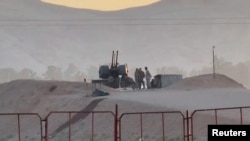Both Tel Aviv and Tehran downplayed Israel’s predawn aerial strike inside Iran on Friday, suggesting neither side wants to see the situation escalate into a full-scale regional conflict.
Israel offered no official comment on the incident.
Iran’s Islamic Republic News Agency, IRNA, reported only that, “citing an Iranian official,” an air defense system had been activated early Friday “after the sound of an explosion” was heard near a major air base in the central Isfahan province.
The report cited U.S. media sources who attributed the attack to Israel. It went on to say there was no damage reported and “the city and province of Isfahan were in normal condition.”
Earlier, Iranian state media had also downplayed the incident, saying Isfahan’s nuclear facilities were secure. They said operations at Tehran’s Imam Khomeini International Airport and Mehrabad domestic airport had returned to normal Friday, several hours after flights were suspended in an apparent response to the purported Israeli airstrike.
Iranian Foreign Minister Hossein Amirabdollahian, in comments Friday to Muslim diplomats at the U.N. in New York, minimized the significance of the attack. He said Israel “tried to make victory out of their defeat, while the downed mini-drones have not caused any damage or casualties.”
Reuters quoted a senior Iranian official as saying there were no plans to respond against Israel for the incident.
The New York Times and The Washington Post cited Israeli officials as saying Israel had carried out an airstrike in Iran. U.S. officials were cited by multiple news outlets as calling it a missile strike.
The muted response by both Israel and Iran came after world leaders almost unanimously called for calm and a de-escalation of tensions.
Italian Foreign Minister Antonio Tajani, the host of the Group of Seven ministerial meeting in Capri, Italy, said Friday Israel had informed the U.S. “at the last minute” of the attack.
Speaking to reporters at a briefing Friday following the G7 meetings in Italy, U.S. Secretary of State Antony Blinken was asked repeatedly to comment about the reports, but he refused to do so.
“The United States has not been involved in any offensive operations,” Blinken said in response. “What we're focused on, what the G7 is focused on, and again it's reflected in our statement and in our conversation, is our work to de-escalate.”
U.N. Secretary-General Antonio Guterres’ spokesperson, Stéphane Dujarric, said the U.N. chief “reiterates it’s high time to stop the dangerous cycle of retaliation in the Middle East.”
“The secretary-general condemns any act of retaliation and appeals to the international community to work together to prevent any further development that could lead to devastating consequences for the entire region and beyond,” the statement said.
The airstrikes mark the latest salvo in a yearslong Israel-Iran shadow war that has escalated significantly this month. Israel had warned Iran that it would retaliate for an unprecedented Iranian aerial assault on Israeli territory last Sunday involving hundreds of drones and missiles. Israel said it intercepted almost all of the projectiles with help from a coalition of Western allies and Arab partners.
Iran had warned, in turn, that any Israeli retaliatory strike would be met with a swift and tougher response.
Ahmed Fouad Alkhatib, a Middle East security analyst at the Atlantic Council, told VOA Iran’s muted response could be an effort to avert an escalated confrontation, if Tehran’s nuclear program is not directly targeted.
“There are estimates and calculations which believe that Iran may be willing to absorb and swallow a limited retaliatory strike by Israel. However, strikes against Tehran's nuclear program will dramatically escalate the direct confrontation between Iran and Israel,” he said.
The U.S. and other Western powers had urged the Israeli government to avoid escalating the conflict in calculating its next move. U.S. officials had said they did not intend for U.S. forces to join in any Israeli retaliatory action.
Alkhatib told VOA the Biden administration understood Israel’s need to carry out a "face saving" retaliation for Sunday’s Iranian attack.
“Any Israeli strike will necessitate U.S. involvement, cooperation, support and ultimate endorsement — defensively and offensively — casting doubt on the accuracy of claims by the Biden administration that it would not be involved in an Israeli retaliation,” Alkhatib said.
Michael Lipin, Patsy Widakuswara, Margaret Besheer and VOA’s Kurdish and Persian services contributed to this report.
Some information for this report was provided by The Associated Press, Reuters and Agence France-Presse.












